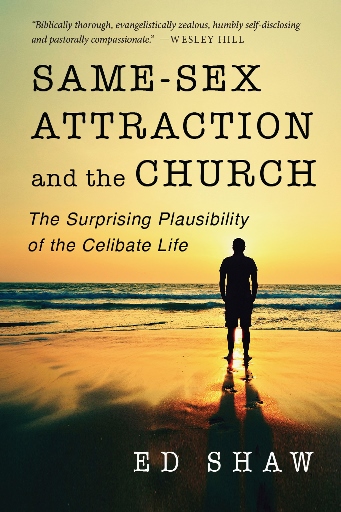Ed Shaw: Same-Sex Attraction and the Church
 Ed Shaw, Same-Sex Attraction and the Church: The Surprising Plausibility of the Celibate Life (Downers Grove: IVP Books, 2015), 172 pages.
Ed Shaw, Same-Sex Attraction and the Church: The Surprising Plausibility of the Celibate Life (Downers Grove: IVP Books, 2015), 172 pages.
Ed Shaw was educated at Durham University and Oak Hill Theological College. He is the pastor of Emmanuel City Centre in Bristol, England, and part of the editorial team at livingout.org. He has worked for churches in Durham and London and was the student minister at Christ Church Clifton for six years before joining Emmanuel in 2009. Shaw is openly same-sex attracted. But Shaw did not have an overbearing mother and a weak figure for a dad. He was not – like I was as a boy – sexually abused by another man. What went wrong, then? Why does he “suffer” same-sex attraction? He notes that he has experienced it since the dawn of puberty – the presumed “teenage phase” never went away, despite his prayers and best efforts to change. How did he end up this way, one may wonder? This book is pastorally sensitive, as one might expect from a writer that experiences same-sex attraction; it is also culturally sensitive, with Shaw recognizing that the god of this age has powerful say over the interpretation of biblical texts, even with those who claim to adhere to a robustly orthodox Christianity.
This book is intended to counteract a lack of plausibility of celibacy by proffering a positive appraisal of how the Church should respond to same-sex attracted people. It leads off with a chapter regarding the plausibility problem of the Church’s historical stance on same-sex attracted people, which notes that if we correct our mistakes as a Church, what Paul and Jesus say about sex and relationships will become more conceivable. In it, Shaw notes that our generation is changing its mind on homosexuality today, not because of the prohibitions of Leviticus or Romans, but because the demand of celibacy simply does not seem reasonable anymore. The second chapter recounts Shaw’s personal struggle with same-sex attraction. Instead of caving into the sexually permissive cultural norms of today, Shaw has found that the more he digs into the biblical text and explored the gamut of Church history, the more his conviction that marriage is a union between a man and a woman has grown. So then, there seems to be a massive gap between what he believes and what he experiences day by day.
The remaining seven chapters comprising this text individually look at a central problem in the Church’s response to same-sex attraction in the world today by focusing on what Shaw terms “missteps”. For example, chapter three looks at the misstep that “your identity is your sexuality.” In it, he shows that the Creator and Redeemer says that all people are his perfect children, even those that are same-sex attracted. Chapter four examines the misstep that a proper “family is a Mom, Dad, and 2.4 children.” Therein, Shaw notes that – seemingly – he will never be fulfilled because he will be forever unable to have progeny, and that even the Church of today has fallen prey to the idea that the Great Commission is not evangelism, but making babies instead. But he offers hope that when the Church acts and feels like a family, he can cope without ever having a partner or children. Chapter five assesses the misstep that if “you’re born gay, it can’t be wrong to be gay.” In it, Shaw claims that even if there were a gay gene to be found, it would not alleviate the sinful nature of homosexual practice, for the Bible recognizes that we are all born with a sin nature, but still holds us accountable for our actions.
Then, chapter five considers the misstep that “if it makes you happy it must be right.” In it, Shaw recognizes that today’s ruling authority is short-term happiness – both inside and outside the Church – but Jesus’ example of delayed gratification is to be our example instead of cultural norms. The misstep that “sex is where true intimacy is found” is spoken of in chapter six, wherein Shaw makes the claim that even without having the ability to marry, his loneliness can be alleviated by intimate relationships that model the one of King David and Jonathon’s, not just by sexual ones. The seventh chapter considers the misstep that “men and women are equal and interchangeable,” which at first sight might be self-explanatory in today’s environment, but Shaw indicates that in righting the wrong of not treating men and women equally, the Church made a disastrous blunder in insisting that sexual differences are irrelevant.
Category: Ministry, Spring 2016


